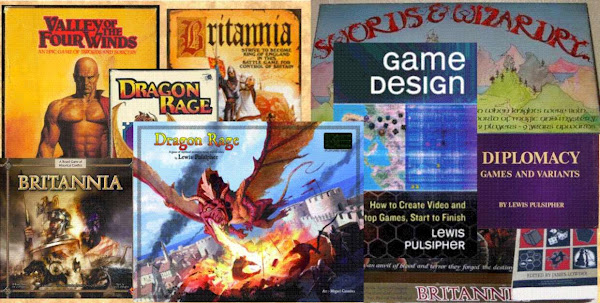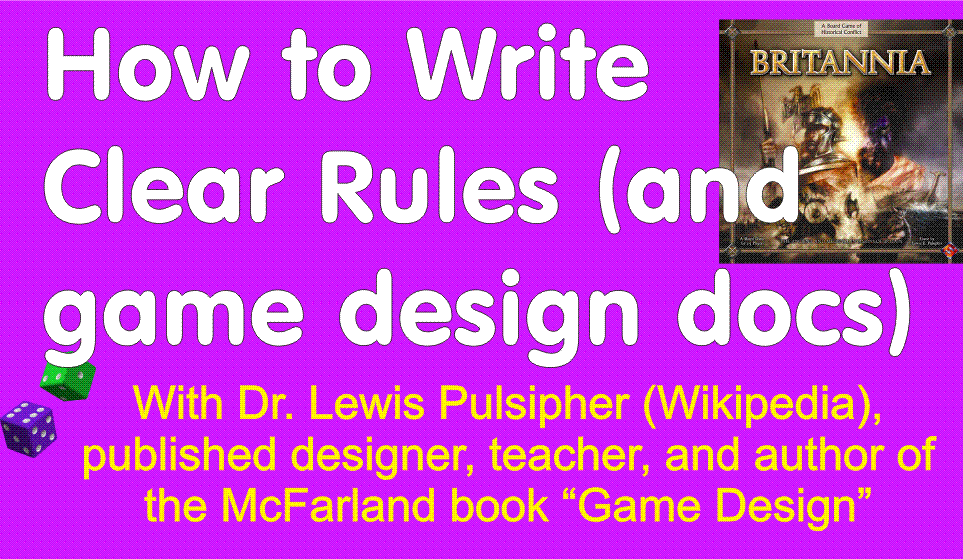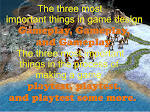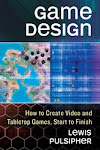What’s important when trying to win FFG Britannia?
(I have chosen to limit this to one page; there will be one page for each color, as well . Copyright 2006 Lewis Pulsipher)
If you think one color “can’t win” (or “can’t lose”), you need a different strategy! The sides are “nearly equal”.
Like virtually all multi-player games, this one is a psychological game as well as a competition on the board. Perceptions count for a lot. If you are in the lead but not perceived to be in the lead, you have an advantage. You want to “control” the game without appearing to. Give other players a better reason to attack someone else than you. You don't want to get in a situation where someone says "well, you didn't leave me with a choice".
To do well you need to know what new units are coming, and when; and where your opponents score their points. Think of your forces as a whole, not as separate nations. Maximize your entire score, not the score of each individual nation. One of your nations can divert an enemy, or “take it on the chin for the cause”, if this will sufficiently improve the score of another.
If you deprive someone of the chance of winning, be sure it’s too late in the game for him to retaliate, or that he’s too weak to harm you.
Something you do in a round could have an effect several rounds in the future. Every little thing you do is important in some way! And there’s plenty of time to recover if you have a bad start.
The question of “who is in the lead” is sometimes unclear, and relates to expected scoring at particular times. The Romans score a lot of points early in the game, the question is, did they score as many as expected? Yellow can have the most points and be in fourth place!
Just because you can take something or kill someone doesn’t mean it’s the best move. Weakening one color can help another of your opponents too much. Sometimes it's important to keep an "enemy" around (whether a color or a nation) because it can help you against someone else later on. Force preservation can be as important as scoring points. Just because you can make a 2-1 attack doesn't mean you should do so.
Points are important, but position is just as important, because position strongly influences who will score most in the future. So you might choose, for example, to keep some raiders peacefully at sea in order to be in better position in the next round. Your armies don't NEED to DO anything as long as they're scoring points (and breeding more armies, usually).
Leaders are far more effective in attack than in defense; they are especially good for attacking difficult terrain.
Better odds mean less death for you. Preserve your forces whenever possible. Three to two is poor attacking odds when defenders are in difficult terrain, as is two to one.
Red and blue have more control over the course of the game during mid-game than yellow and green; red and blue can get very high (or low) scores, green and yellow rarely get very high scores. So green and yellow want to avoid someone (usually red or blue) getting way ahead during midgame. Expect the Romans to max or nearly max their R3 points. The Roman difference comes in position, Limes points, and points scored by opponents by R5.
Don't forget, when running a big invasion, to leave yourself in a defensible position. When it's a Major Invasion, be sure to attack with every army (if you attack at all) in the first half: don't waste them "holding territory" that you'll be able to occupy in the second half.
Advice about multi-player conflict games in general: Never make a threat you’re unwilling to carry through; always honor your deals (never break a deal). If you're inexperienced, don't make any long-term deals. Simple deals help you and your “ally”, and usually harm the other two players; e.g., red and blue often agree on a demarcation between the Saxons and the Angles. Simple deals (= "common sense") often work best.
Saturday, September 30, 2006
Saturday, September 16, 2006
Because of schedule problems (my schedule) we haven't playtested anything at CCCC in three weeks. I did get to Rick Steeves' in Durham last night for the usual monthly game night. Four games of Law & Chaos, plus Viking Gold(TM) for the first time with four players. I think the game is too long with four, and more decisively perhaps, it wears out the defense. Only two areas (one the Mediterranean) remained unsacked, and hardly any defending armies survived in the entire British Isles. East Frankia was pretty much wasted as well, despite two rounds when famine limited Viking activity there. Even the castles were going down. So I'm going to reduce the number of action cards per round, or the number of rounds, when more than three play. With three it seems to give about the right proportion of Vikings and defenders surviving at the end of the game.
I'm not sure how exciting the game is... only time will tell. It is certainly more complex than Seas of Gold(TM), but this appears to be unavoidable if the result is going to resemble the real world at all.
I'm not sure how exciting the game is... only time will tell. It is certainly more complex than Seas of Gold(TM), but this appears to be unavoidable if the result is going to resemble the real world at all.
Tuesday, September 05, 2006
The Penguin Historical Atlas of Ancient Civilizations by John Haywood. Penguin, 2005.
If I had to give one piece of advice about historical atlases, I'd say "John Haywood". And I'm once again not disappointed by these 144 small-format pages covering many civilizations both well known (Egypt) and obscure (Iberian). As with other Penguin historical atlases, we get about a page of text with a page worth of maps for each entry. A civilization as large and old as China's gets several entries, where the Iberians get one. I'm sure I'll use it as a source for both China games and near east games as time passes.
If I had to give one piece of advice about historical atlases, I'd say "John Haywood". And I'm once again not disappointed by these 144 small-format pages covering many civilizations both well known (Egypt) and obscure (Iberian). As with other Penguin historical atlases, we get about a page of text with a page worth of maps for each entry. A civilization as large and old as China's gets several entries, where the Iberians get one. I'm sure I'll use it as a source for both China games and near east games as time passes.
Monday, September 04, 2006
The Disease, Game Design Class
I sometimes have so much fun creating new games, or modifying existing ones that I've set aside, that I don't always work on finishing games the way I should. Likely that's because there's a lot of drudgery in the "last 20%" of the work.
So in the past few days I've revived a China game, revived a game of rise and fall of empires (not Brit-like, some elements of Vinci), thought again about Middle-eastern Brit, got an actual set of rules together for "Advanced Britannia", and so forth. What I should be doing is finishing Brit scenarios and then working on Caledonia(TM), which is close to ready for playtesting by other people.
So I beat myself up about this, then remember that I'm supposed to be enjoying myself--this is a hobby, not a business.
To change the subject:
I will be teaching "How to Design Games" in a new class at CCCC Sanford (NC) Campus, from October 3 to November 16, Tuesday and Thursday nights 6-8:30. This is a Continuing Education class (not college credit). The class is scheduled for room 201, Wilkinson Hall. I don't have preregistration details right now
We cover video games, board games, and card games.
The Secret: it’s very hard to learn to design video games by designing video games because a working prototype is so hard to produce. We’ll learn by designing board/card games and apply this to video.
I sometimes have so much fun creating new games, or modifying existing ones that I've set aside, that I don't always work on finishing games the way I should. Likely that's because there's a lot of drudgery in the "last 20%" of the work.
So in the past few days I've revived a China game, revived a game of rise and fall of empires (not Brit-like, some elements of Vinci), thought again about Middle-eastern Brit, got an actual set of rules together for "Advanced Britannia", and so forth. What I should be doing is finishing Brit scenarios and then working on Caledonia(TM), which is close to ready for playtesting by other people.
So I beat myself up about this, then remember that I'm supposed to be enjoying myself--this is a hobby, not a business.
To change the subject:
I will be teaching "How to Design Games" in a new class at CCCC Sanford (NC) Campus, from October 3 to November 16, Tuesday and Thursday nights 6-8:30. This is a Continuing Education class (not college credit). The class is scheduled for room 201, Wilkinson Hall. I don't have preregistration details right now
We cover video games, board games, and card games.
The Secret: it’s very hard to learn to design video games by designing video games because a working prototype is so hard to produce. We’ll learn by designing board/card games and apply this to video.
Sunday, September 03, 2006
Book "review"
The Huns by E. A. Thompson, edited by Peter Heather, is a revised reissue of the 1948 book A History of Attila and the Huns. Heather minimally revised the book based on the wishes of Professor Thompson, who died at a very advanced age during the time of revision. Hence the book shows some old-fashioned characteristics, for example a concentration on the (fragmentary) literary sources at the expense of archaeology. In 1948 there was next to no archaeology to illuminate the Huns. Today this is no longer true, but Heather chose minimal revision rather than complete revision, and points the reader to new sources in his very extensive Afterword.
One of the objectives of the book is to show that Attila was not a genius, certainly not a military genius, and that the Hun empire existed before Attila, and could have existed thereafter (as did the empire of Genghis Khan). Attila died prematurely, however, leaving many sons, and the Hun empire soon fell apart.
Reading a book this detailed is not generally necessary for games as broad as Britannia and its ilk. I do learn many details that aren't so clear in books of broader scope. For example, I knew that Aetius, the patrician who defended (and dominated) the West Roman Empire for more than two decades, was a friend of the Huns, and used the Huns to prop up the empire despite the crippling loss of Africa to the Vandals in 429. I had not realized that he was a more or less lifelong enemy of the Visigoths, who had settled in southwestern France after sacking Rome in 410. The biggest criticism of Attila is that he managed to fight his friend Aetius, and force Aetius into alliance with his lifelong enemy the Visigoths, at the Catalaunian Fields in 451. While exactly what happened during the battle is unknown, the Huns withdrew afterward.
Thompson and Heather don't spend much time on the Huns before or after Attila's death, but there's more detail here, again, then I've had from broader histories. The Huns didn't just disappear, even after their defeat in 454 by the Gepids. "Huns" were in the Balkans for many decades thereafter (one can trace partial histories of some of Attila's sons), though one of the problems we have is that the word "Huns" became a generic word for steppe barbarians.
The Peoples of Europe series, Blackwell, 1999. I bought a used copy through Amazon.
The Huns by E. A. Thompson, edited by Peter Heather, is a revised reissue of the 1948 book A History of Attila and the Huns. Heather minimally revised the book based on the wishes of Professor Thompson, who died at a very advanced age during the time of revision. Hence the book shows some old-fashioned characteristics, for example a concentration on the (fragmentary) literary sources at the expense of archaeology. In 1948 there was next to no archaeology to illuminate the Huns. Today this is no longer true, but Heather chose minimal revision rather than complete revision, and points the reader to new sources in his very extensive Afterword.
One of the objectives of the book is to show that Attila was not a genius, certainly not a military genius, and that the Hun empire existed before Attila, and could have existed thereafter (as did the empire of Genghis Khan). Attila died prematurely, however, leaving many sons, and the Hun empire soon fell apart.
Reading a book this detailed is not generally necessary for games as broad as Britannia and its ilk. I do learn many details that aren't so clear in books of broader scope. For example, I knew that Aetius, the patrician who defended (and dominated) the West Roman Empire for more than two decades, was a friend of the Huns, and used the Huns to prop up the empire despite the crippling loss of Africa to the Vandals in 429. I had not realized that he was a more or less lifelong enemy of the Visigoths, who had settled in southwestern France after sacking Rome in 410. The biggest criticism of Attila is that he managed to fight his friend Aetius, and force Aetius into alliance with his lifelong enemy the Visigoths, at the Catalaunian Fields in 451. While exactly what happened during the battle is unknown, the Huns withdrew afterward.
Thompson and Heather don't spend much time on the Huns before or after Attila's death, but there's more detail here, again, then I've had from broader histories. The Huns didn't just disappear, even after their defeat in 454 by the Gepids. "Huns" were in the Balkans for many decades thereafter (one can trace partial histories of some of Attila's sons), though one of the problems we have is that the word "Huns" became a generic word for steppe barbarians.
The Peoples of Europe series, Blackwell, 1999. I bought a used copy through Amazon.
Subscribe to:
Posts (Atom)










